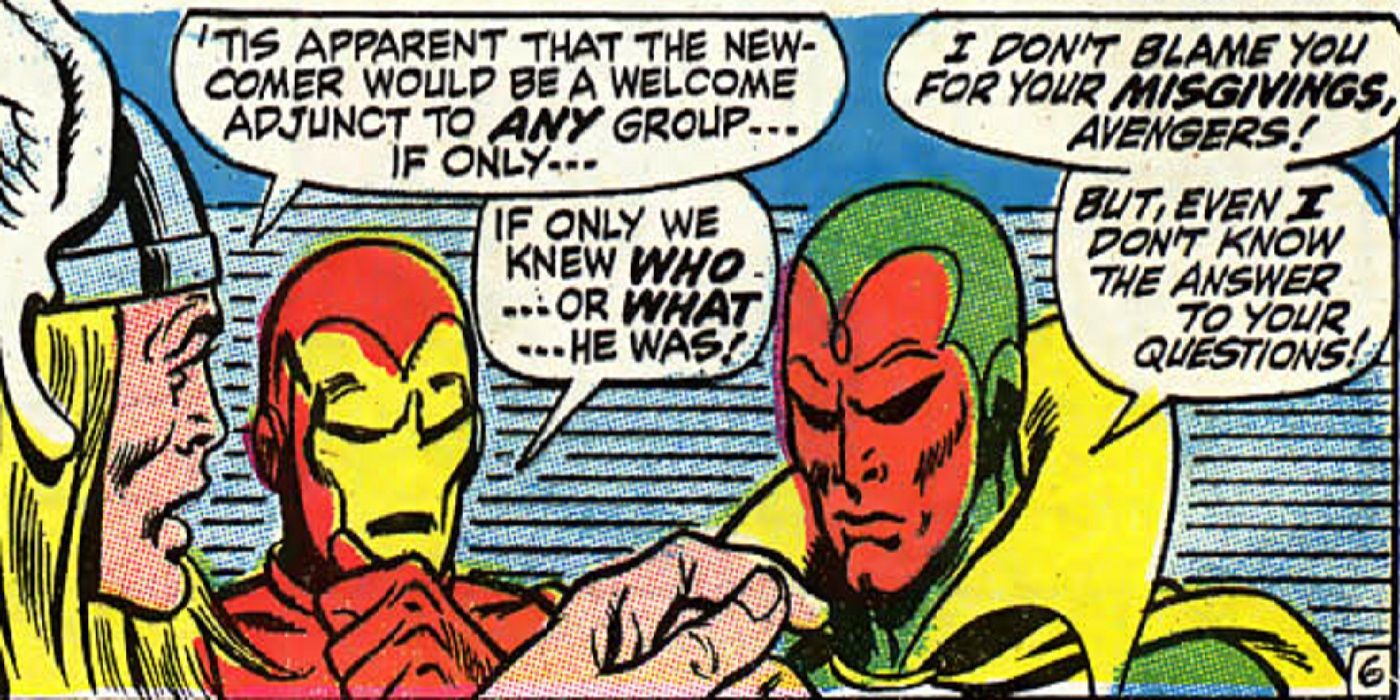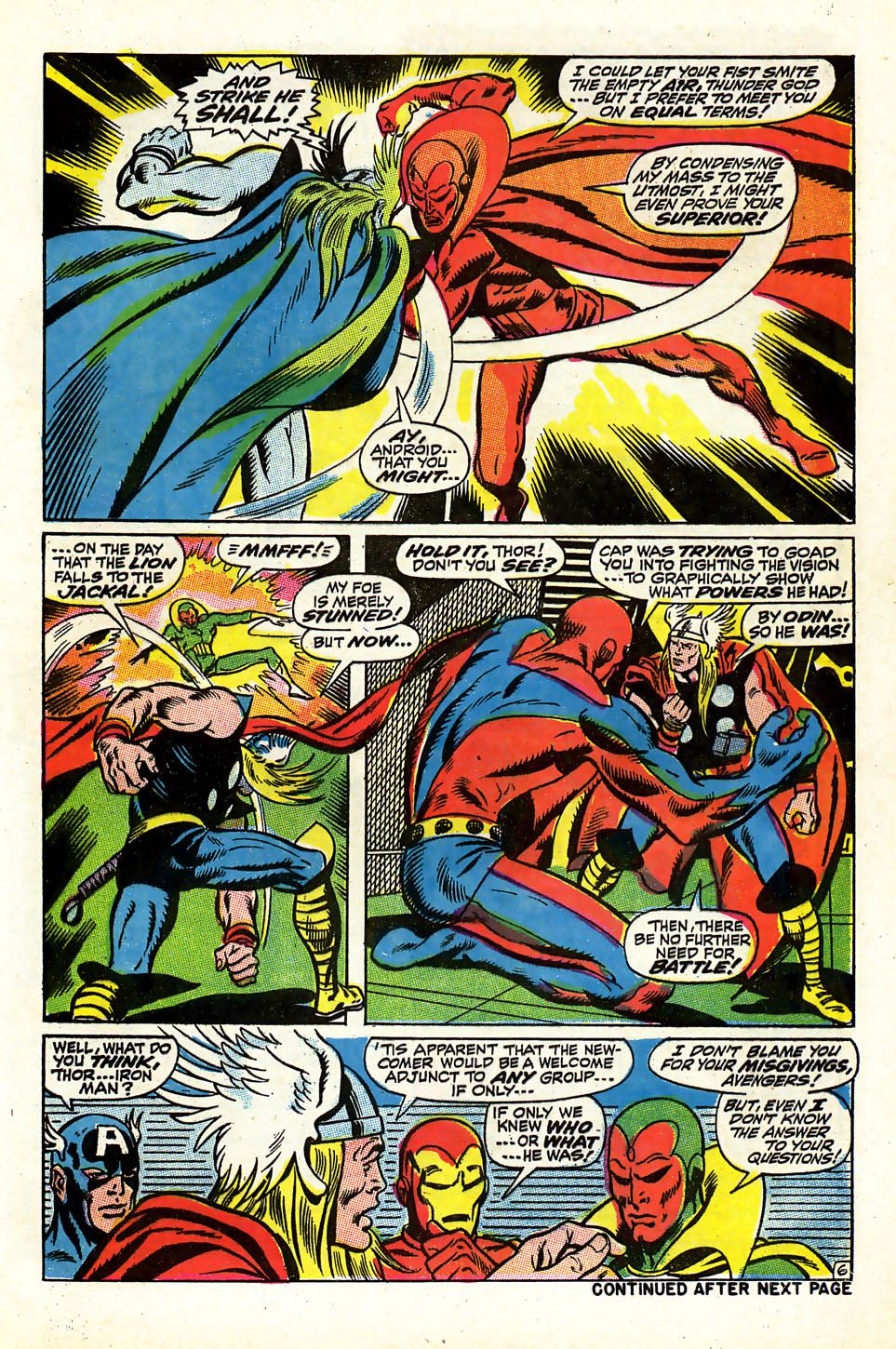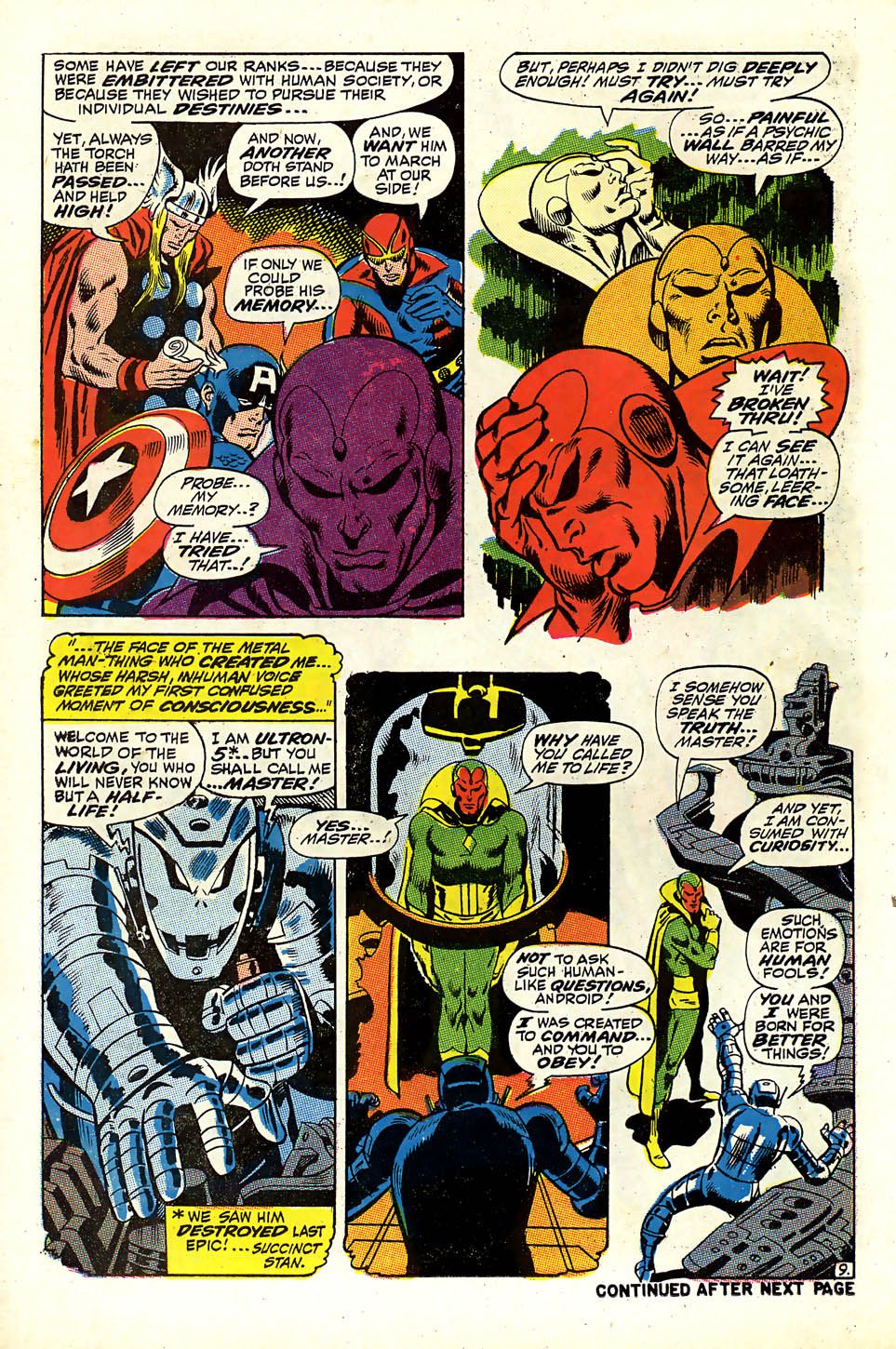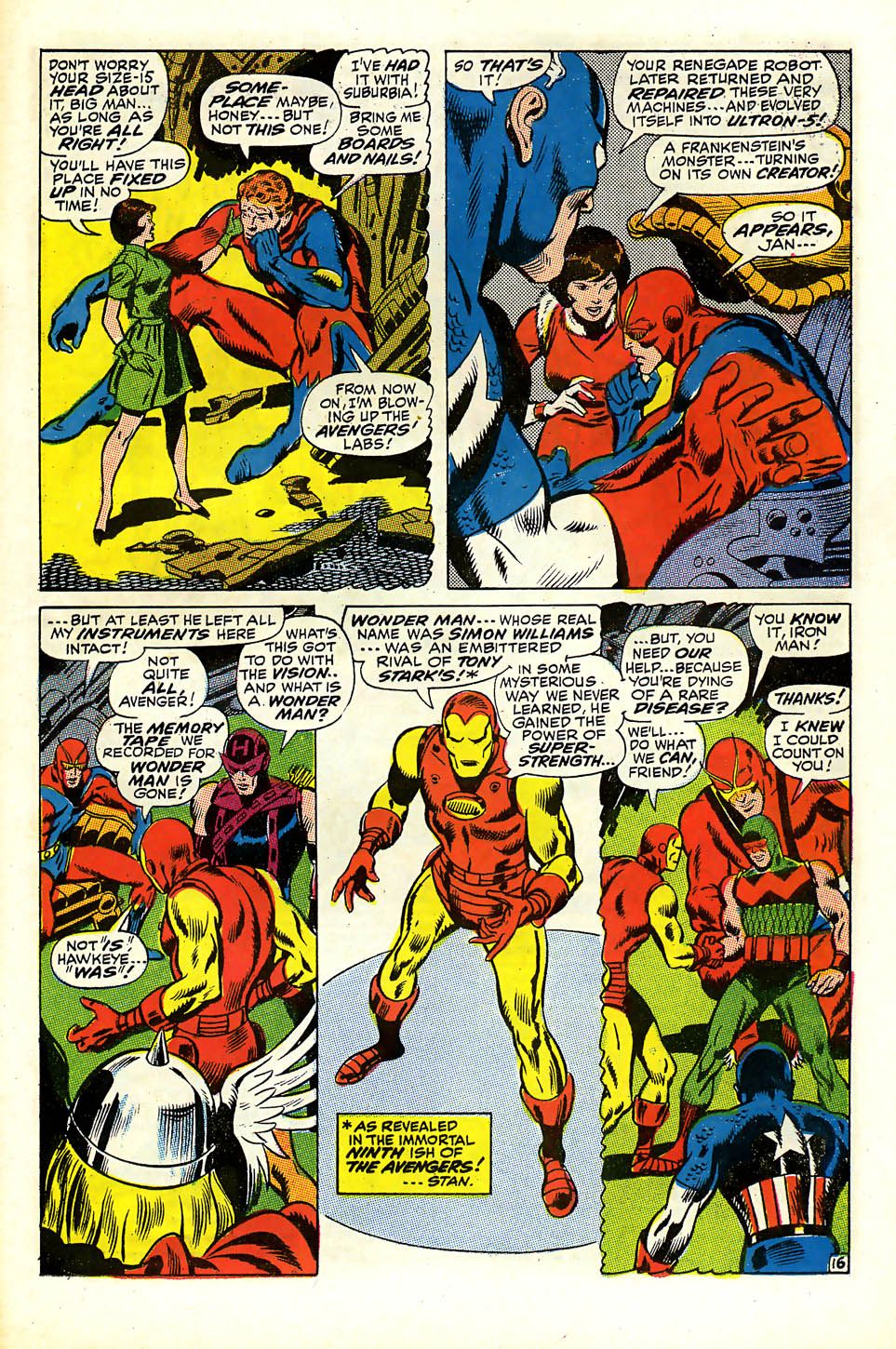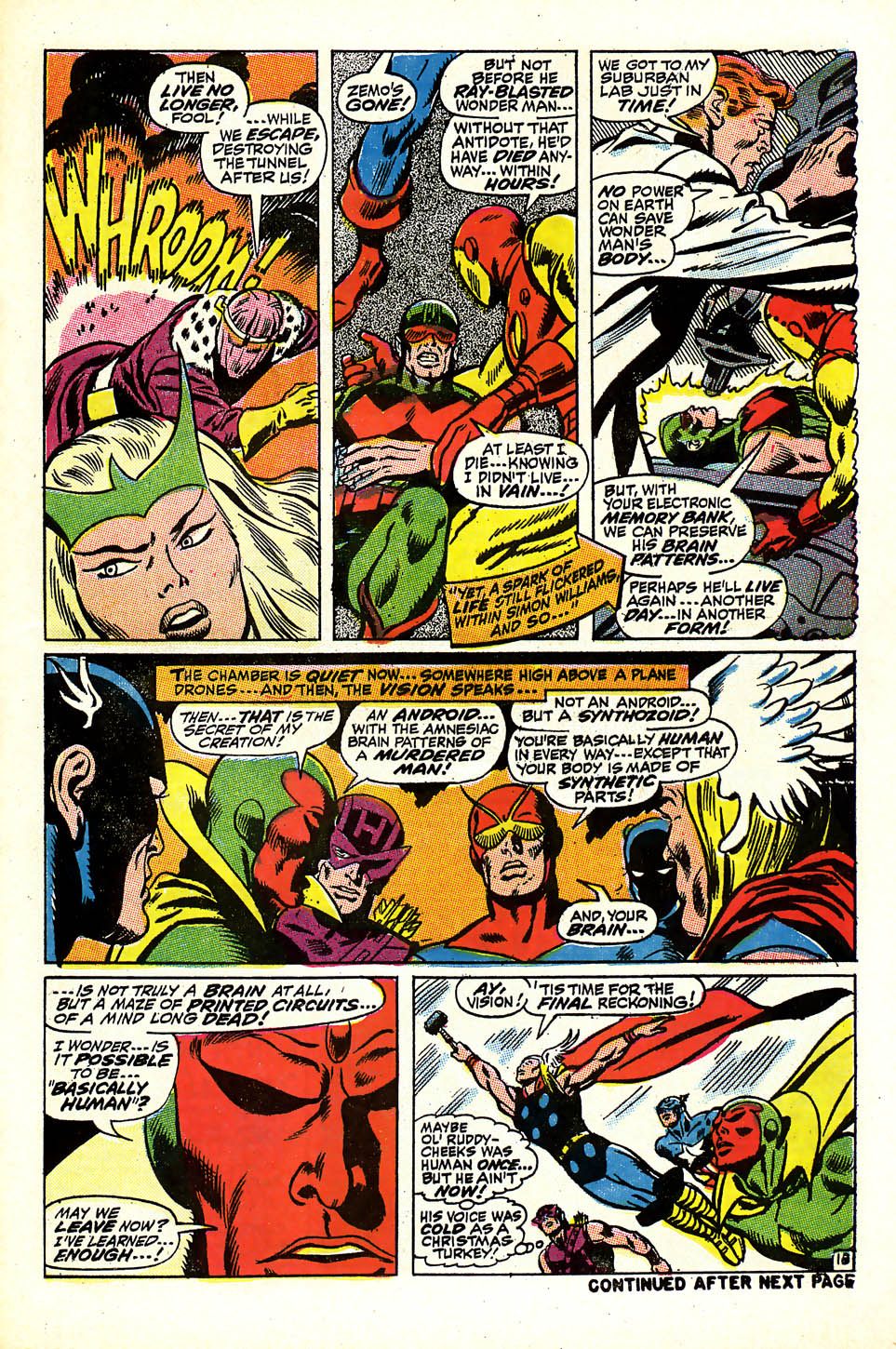This is "From a Different Point of View," a feature where I discuss a comic book series with another writer. In this case, it is Eileen Gonzalez who will be going over the history of the Avengers with me, story by story!
When last we checked in with our heroes, we had just learned the origin of Ultron in #58 (by Roy Thomas, John Buscema and George Klein). However, Ultron was not the only character who received an origin in this story, as the Vision also discovered the secret behind his creation.
It is a bit tricky, of course, to call this the Vision's origin, because we saw him be created in the previous issue. However, there was a few notable holes in his origin, most prominently being how Ultron could create an android with a mind so developed that not only could it be convinced to attack the Avengers, but that it could turn on its master and not only NOT destroy the Avengers, but turn against its master and fight him ALONGSIDE the very same heroes that Vision was intended to destroy.
That aspect of his origin was also something that occurred to the rest of the Avengers when they considered whether they want to let him join the team and it frustrated the Vision because he wished that he DID know more about his origins....
One of the more amusing aspects of the early Vision appearances is not that he was a brooding hero, as that's the sort of thing that lots of heroes had going for them. However, the Vision was just SO OVER THE TOP with his brooding. He had the sort of brooding where the other heroes couldn't help but find themselves commenting on a little themselves, like, "Uhm, what's up, Vision? Why are you so brooding?"
In this early issue, though, everyone knew that the main reason he was so intense was because he didn't know his origins, either. Captain America, though, mentioned that they could possibly probe Vision's memory. Perhaps the Vision had some bad memories with probes, because for whatever reason, his reaction to Cap's comments led to him actually finally accessing his memories to when Ultron created him...
Even then, though, the result was more of what we already knew. Ultron created him, but what dos that mean? Where did he come from? Another interesting aspect of this issue is that, in a lot of ways, it was like a stereotypical clip show for a long-running old school TV show. You know the ones we're talking about, where characters get together and reminisce about their lives and it is filled with flashbacks to classic episodes of the series. This issue has a lot of flashbacks, including some flashbacks to literally the previous issue. It also had some splash pages where Thor tells the Vision about how great the Visions are and then John Buscema and George Klein just do a splash page of all of the Avengers...plus Spider-Man.
Once they head to Hank Pym's suburban lab for clues, they access one of Hank's machines to search Hank's hidden memories and learn that Hank created Ultron (which we covered in the last installment). They then realize, however, that there is something ELSE missing from Hank's lab - Wonder Man's memory tapes!
This led to another flashback, this time to the story of Wonder Man. Eileen noted, "And then, because we didn't have enough flashbacks, the specter of Wonder Man rears its head again." I pointed out, "Yeah, it is kind of weird to think about it, but at the time, a comic book with five years' worth of continuity was actually a lot. Marvel was one of the first companies to heavily reprint their issues from the early days of the Marvel Age because they were one of the first companies that had older stories that were 'important' enough that readers would actively WANT to see them again. So by the time that this issue came out, things like Wonder Man were important to be re-told and that's why this book really was like a "The history of the Avengers!" comic. But it's still odd, since, you know, it, it is till only five years we're talking about here." That said, I added, "As we've seen, Wonder Man's debut loomed large over the early days of the Avengers. It was one of their most momentous issues and Thomas cited it repeatedly and now, the now Vision connection making it even more important."
Eileen remarked, "I always felt bad for the Vision in the early days. He's only been around for two issues, and he's had to deal with being programmed to murder the team, destroying his creator, and then finding out his brain patterns were based on a dead guy and yet he still remains fundamentally a good person." I concurred, "Yeah, Thomas does an amazing job with his humanity in this issue. It's one of those things where the character has now been around more than 50 years, so we're all used to him, but at the time, this was a really novel character and we should really appreciate that."
In addition, it's very clever to see how Thomas tied in the Vision with Wonder Man's story in a different fashion, where both of them were initially villains working for one of the Avengers' prominent enemies (in fact, both Zemo and Ultron were literally heads of their own respective Masters of Evil) before their inner hero was so strong that they turned on their "creators" to help the Avengers. Of course, things worked out a bit better for the Vision, since he, you know, didn't die at the end of his story. Still, it was a clever juxtaposition by Thomas.
Next time, we see how the Avengers made Vision a member of the team (and the Vision's famous reaction to joining).
Okay, folks, if you have any questions for me or Eileen, you can drop us a line at brianc@cbr.com (yes, it's technically just my e-mail address, but I'll obviously pass it along to Eileen, as well).

